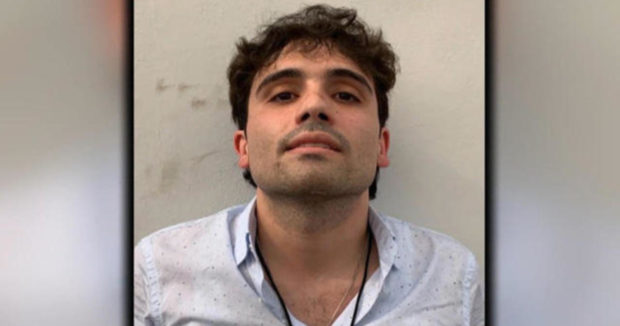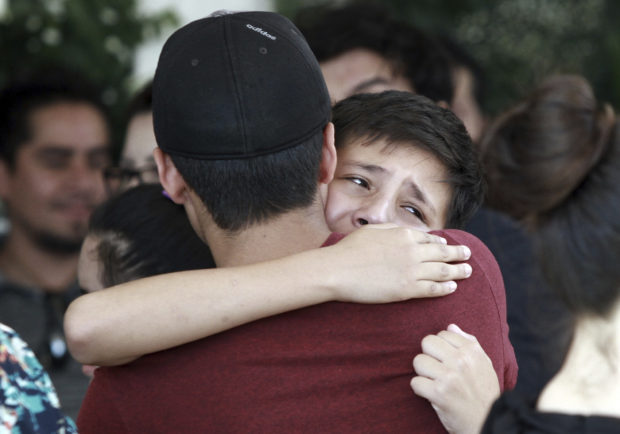Trump Plan to List Mexican Cartels as ‘Terrorist’ Groups
Donald Trump’s plan to designate Mexican drug cartels as terrorist organizations have ignited a raging debate in Mexico on whether the groups’ horrific violence should be considered terrorism.
Mexicans broadly agree on one thing, though: they don’t want the American president’s help.
And experts say such a designation would have little impact on the ground, anyway.
HAPPY THANKSGIVING! pic.twitter.com/7SGZnHindW
— Donald J. Trump (@realDonaldTrump) November 28, 2019
Mexico’s powerful cartels have certainly sown terror, whether throwing grenades into a packed crowd, hanging headless corpses from bridges, laying siege to city streets or — the incident that drew Trump’s attention — massacring nine Mormon women and children who had dual US-Mexican citizenship.
But experts say that on one key point, organizations like the Sinaloa or Jalisco New Generation cartels differ from the groups the United States has blacklisted as Foreign Terrorist Organizations.
Whereas Al-Qaeda, the Islamic State group, ETA, the Revolutionary Armed Forces of Colombia (FARC) and the rest of the 68 groups on the list have political or religious motives, drug cartels’ main goal is making money.
“Mexican cartels can’t be compared to the FARC, for example, which certainly had links to drug trafficking but was not exclusively an organized crime group,” said Jorge Castaneda, a Mexican academic and former foreign minister.
“This is the first and only time” the US has moved to add mafia groups to the list, he told AFP.
“These organizations have no political component.”
Narco Terrorists

Inside were 17 members of three Mormon families. The gunmen killed three women and six children, including twin eight-month-old babies, and set one of the vehicles on fire with the occupants inside.
Prominent members of one of the families, the LeBarons, sent a petition to the White House urging Trump to designate Mexican cartels as terrorist groups.
“Their unbridled acts of violence and murder have overrun our borders and created an international crisis,” it said.
“They are terrorists, and it’s time to acknowledge it!”
That triggered a politically charged debate in Mexico.
On social media, the hashtags “traitors” and “LeBarons get out of Mexico” went viral.
But others rallied behind the family’s call to label narco-violence terrorism.
“That is what they try to provoke: terror. Leaving dismembered bodies in public with threatening messages causes terror among the civilian population,” said Diego Sinhue Rodriguez, governor of the central state of Guanajuato and an opponent of leftist President Andres Manuel Lopez Obrador.
Minimal Impact on the Ground

Youths comfort each other at the funeral of elementary school principal Elsa Mendoza, of one of the 22 people killed in a shooting at a Walmart in El Paso, in Ciudad Juarez, Mexico, Thursday, Aug. 8, 2019. Mexican officials have said eight of the people killed in Saturday’s attack were Mexican nationals. (AP Photo/Christian Chavez)
But Mexicans have broadly rejected Trump’s push to designate cartels as terrorist groups, as well as his earlier offer on Twitter for the US to help Mexico “wage WAR on the drug cartels and wipe them off the face of the earth.”
The remark on “designating” cartels came in response to a question from conservative media host Bill O’Reilly, who asked whether Trump would react to the Mormon massacre by adding the groups to the blacklist and “hitting them with drones.”
Trending Articles
“I don’t want to say what I’m going to do, but they will be designated,” Trump said.
Any hint of US intervention, military or otherwise, is an instant insult to national pride in Mexico, which still resents losing more than half its territory to the United States in 1848 after the Mexican-American War — just one on a long list of grievances.
Foreign Minister Marcelo Ebrard huffed at a “violation of national sovereignty” after Trump’s statement.
Even Lopez Obrador, who has tried to maintain a relationship of “peace and love” with Trump, responded, “cooperation yes, interventionism no.”
“Mexico’s national history is constructed upon the reference point of an expanding, domineering, imposing, imperious United States,” said Carlos Rodriguez Ulloa, of Mexican security think tank CASEDE.
But the debate is mostly symbolic, anyway, experts agree.
Little would change on the ground if the United States blacklisted Mexican cartels, because the countries already cooperate extensively against them, on both the security and financial fronts.
US planes have been flying Drug Enforcement Agency (DEA) missions over Mexican territory for more than 25 years, said Castaneda.
“There are DEA agents based here permanently, American personnel embedded with the Mexican marines, accompanying them on their missions… All this is happening already,” he said.
“If the United States tells Mexico, ‘I want to send in a drone tomorrow,’ … Mexico is going to say, ‘Yeah, go ahead.’ There’s no need to treat it as an invasion.”

